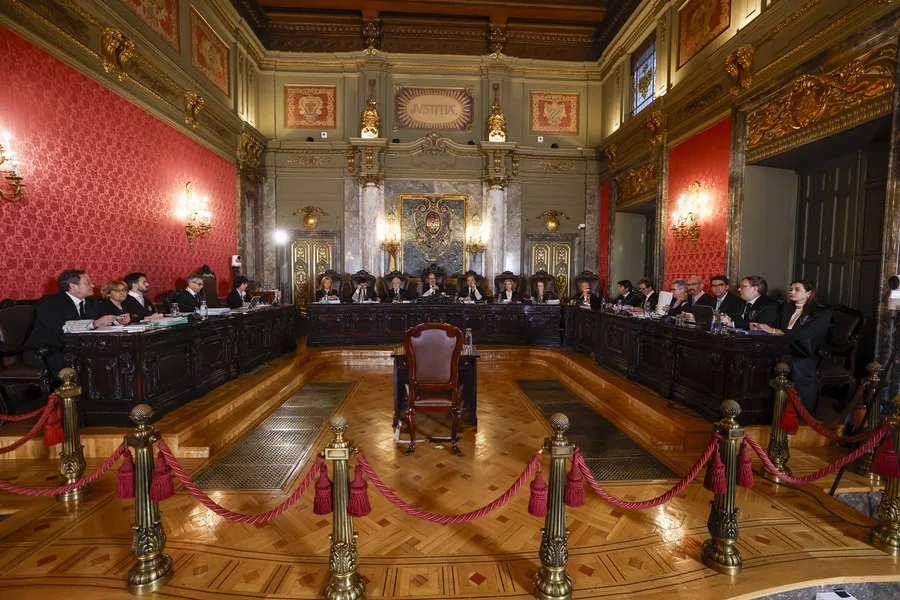Julio García
The Attorney General, Álvaro García Ortiz, stated this Monday that he does not consider himself the author or responsible party for the alleged crime of revealing secrets in the supposed leak of an email related to the tax fraud case against Alberto González Amador, Isabel Díaz Ayuso’s partner.
The hearing began with the court clerk reading the order to open the trial, which the Attorney General, dressed in his robes, followed attentively, taking notes with a pen, according to EFE.
Following this, the presiding judge, Andrés Martínez Arrieta, declared the trial open and immediately asked the Attorney General: “Mr. García Ortiz, do you consider yourself responsible for the crimes with which you are charged?”
“No,” the Attorney General replied from the bench, where he sat to the right of the state attorneys representing him.
Following this, the preliminary hearing began, during which the private prosecution representing Díaz Ayuso’s partner, along with other plaintiffs, requested the admission as evidence of communications between a journalist from Cadena Ser and González Amador’s lawyer, who proposed the plea bargain, as well as an article from El País.
The Public Prosecutor’s Office, which is seeking acquittal, also addressed the court, alleging violations of fundamental rights, specifically the inviolability of the home, the secrecy of communications, and the right to an impartial judge. They presented several documents, including certification that the controversial email remains in the general address of the Economic Crimes Prosecutor’s Office.
García Ortiz, dressed in a suit and black tie, arrived by car around 9:42 a.m. He entered alone through the main entrance of the high court, reserved for dignitaries and facing the central Plaza Villa de París, where he was greeted with applause by a few people.
On the first day of the trial, Julián Salto, the prosecutor investigating the tax fraud case against Alberto González Amador, stated that he did not understand how the emails under investigation, which are “private,” could have been in the possession of Miguel Ángel Rodríguez, Chief of Staff of the Community of Madrid.
In his testimony, the prosecutor said he believed that “according to Article 5 of the Code of Ethics for Lawyers, emails between the prosecutor and the lawyer were strictly private.”
He added: “I understand that neither Mr. González Amador nor the Chief of Staff of the Community of Madrid should have them.”
Miguel Ángel Rodríguez gained access to an email related to the case, dated March 12, which was forwarded to him by Ayuso’s partner, who in turn had received it from her lawyer, Carlos Neira. Later, the Chief of Staff shared it in a chat group of journalists.
Salto explained the chain of calls and messages exchanged on the night of March 13 with the provincial prosecutor of Madrid, Pilar Rodríguez, and the chief prosecutor of the Community of Madrid, Almudena Lastra, maintaining that he received a “legal order” to send those emails. “I don’t see anything strange about it,” he added.
In this regard, he stated that he received contradictory messages because the first prosecutor conveyed “urgency” to forward the emails, while the second told him that “there was no rush” since she was at a match and could therefore wait until the next day.
The prosecution is seeking prison sentences
For García Ortiz, the prosecution—the private prosecution led by González Amador and six private prosecutions—is requesting between four and six years in prison and up to twelve years of disqualification from public office, while the Public Prosecutor’s Office maintains that no crime was committed and, like the State Attorney’s Office, is requesting acquittal.
Monday’s session will be almost entirely dominated by testimonies from prosecutors who will recount their experiences during those days, between February 2 and March 14, 2024. Among them will be prosecutor Julián Salto, who exchanged emails with the lawyer for Díaz Ayuso’s partner; and his superiors: the provincial prosecutor of Madrid, Pilar Rodríguez, whose case was dismissed by the Supreme Court just before trial; and the chief prosecutor of the Community of Madrid, Almudena Lastra.
Lastra was the one who alerted the Attorney General on the night of March 13 that, according to what she had been told, Díaz Ayuso’s chief of staff, Miguel Ángel Rodríguez, had leaked to journalists that it was the Prosecutor’s Office—and not the lawyer—that had offered a plea deal, and that it had been withdrawn “on orders from above.”
She disagreed with the Attorney General about the content of the press release and testified before the judge that on the morning of March 14 she asked García Ortiz, “Álvaro, did you leak the press release?” although she later said she questioned him about the emails. García Ortiz, who denied any leak, reflected before the judge on Lastra’s “disaffection” toward the top prosecutors.
Also summoned this Monday are the number two in the Technical Secretariat of the Prosecutor’s Office, Diego Villafañe, and the press officers of the Attorney General’s Office and the Madrid Prosecutor’s Office.
